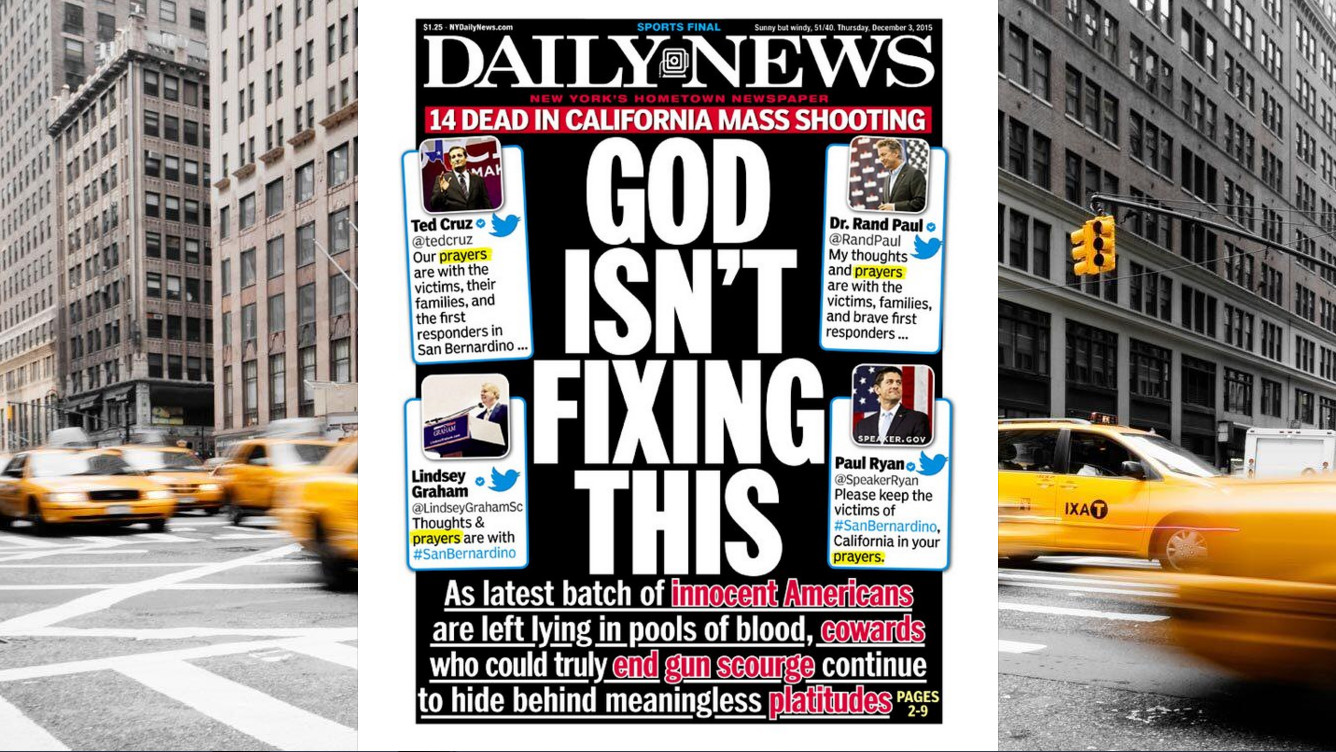Terry Pettit stood outside the Inland Regional Center in San Bernardino, California, yesterday afternoon and feared for his daughter’s life.
Inside the center for the developmentally disabled was a scene of horror, which Pettit’s daughter described in a text message.
“Shooting at my work. People shot,” she told her dad, according to CNN. “Pray for us. I am locked in an office.”
Prayers were also offered at Arrowhead Regional Medical Center, where victims of the mass shooting—which left 14 people dead and 17 wounded—were taken. Also at the nearby Rock Church and World Outreach Center, where workers from the center were reunited with their families. Many prayers were facilitated by the Billy Graham Rapid Response Team in its third shooting-related deployment since October.
On social media and in some news outlets, prayers—especially from Republican politicians—were less welcome.
George Zornick, Washington editor for The Nation, posted a graphic of tweets from presidential candidates, showing a stark contrast in their responses to America's deadliest shooting since Sandy Hook Elementary three years ago.
“My thoughts and prayers are with the shooting victims and their families,” tweeted Ben Carson.
“I refuse to accept this as normal,” tweeted Hillary Clinton. “We must take action to stop gun violence now.”
“God Isn’t Fixing This,” declared a headline in the New York Daily News. The Daily News also provided a round-up of responses from candidates and gave this assessment: “Prayers aren’t working.”
Those responses led to a social media debate over so-called “prayer shaming,” which Emma Green of The Atlantic described this way: “Anger about the shooting was turned not toward the perpetrator or perpetrators, whose identities are still unknown, but at those who offered their prayers.” She wrote:
There's a clear claim being made here, and one with an edge: Democrats care about doing something and taking action while Republicans waste time offering meaningless prayers. These two reactions, policy-making and praying, are portrayed as mutually exclusive, coming from totally contrasting worldviews.
Rod Dreher of The American Conservative offered a defense of prayers for victims of mass shootings: “To religious believers, prayers are not 'meaningless platitudes,' but appeals to the Creator of the universe to help the suffering, as well as an expression of empathy and solidarity with those who suffer.”
Dreher sees the debate over prayer shaming as a sign that traditional Christians are becoming increasingly alienated from American culture.
In an op-ed for the Acts of Faith blog at The Washington Post, Russell Moore wrote that prayer is one way that people of faith show they care about their neighbors. That doesn’t preclude them from taking action on social issues, he argued. But prayer can also affect the world around us, he wrote.
“For religious people, of all sorts, prayer is doing something,” he wrote. “We do believe that God can intervene, to comfort the hurting and even to energize ourselves and others for right action.”
David Gibson, a noted reporter for Religion News Service (RNS), suggested that more discussion about the nature of prayermight be in order.
“Amazing how many people don’t understand what prayer is,” he tweeted. “Calling all religion writers.”
Laura Turner, a contributor to CT’s Her.meneutics blog, pointed readers back to the scriptures when looking for how to pray in response to mass shootings.
She pointed to Jesus’ words from Matthew 6 about praying in private, rather than public. Twitter, she wrote in a RNS blog post, is probably the wrong place to pray.
“But perhaps we should not be so quick to use social media as a means for our prayer,” she wrote. “Perhaps we should go into out rooms, shut the doors, and pray there. And then, when we come out, we should demand change.”
The tension over the connection between religious behavior and public action has biblical roots. Isaiah warns of the dangers of those who fast and make a show of their religion, but who then mistreat or neglect the welfare of their neighbors.
“Your fasting ends in quarreling and strife, and in striking each other with wicked fists,” wrote the prophet in Isaiah 58:4.
Isaiah then describes public action as a way to seek God’s favor in society.
Then there’s the Lord’s Prayer, where Jesus taught his disciples to pray, “Thy kingdom come, thy will be done on earth as it is it heaven.”
On his CT blog, Ed Stetzer assesses prayer shaming and a better way. CT's Andy Crouch editorializes on why "thoughts and prayers" are the proper first response to tragedy.
[Image is screenshot of much-retweeted New York Daily News Twitter post.]








